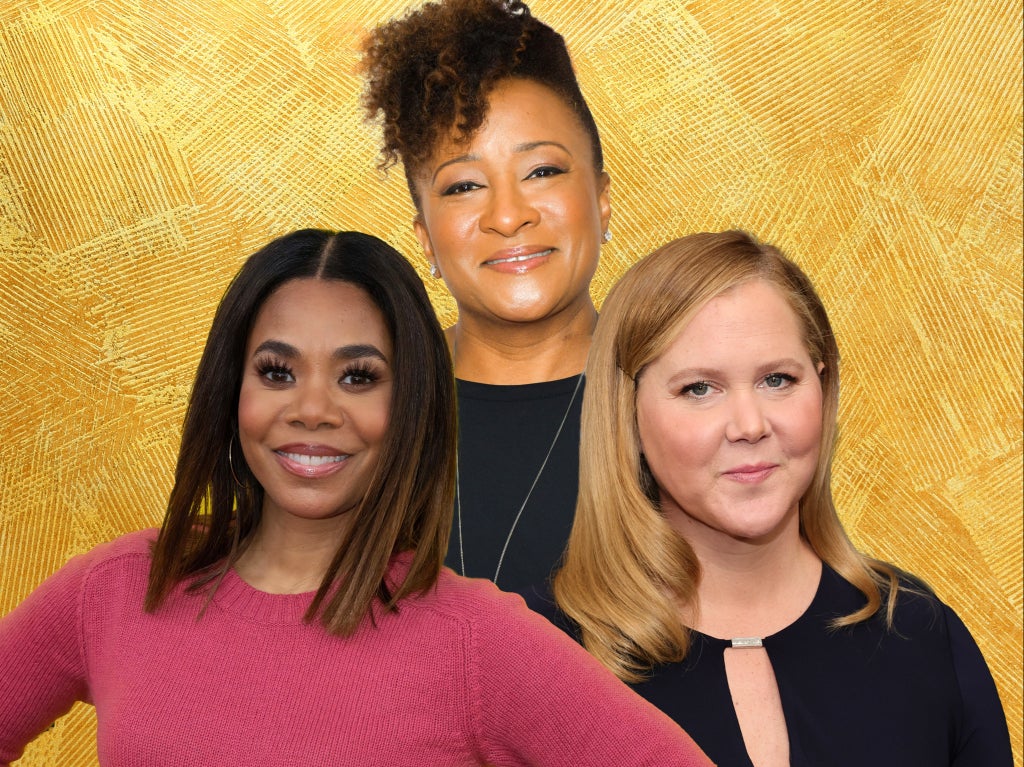
Even in the best of circumstances, hosting the Oscars has become a thankless task. Perhaps in the time of Bob Hope or Johnny Carson, it was simpler. You just had to go out and compere, crack a few droll jokes, keep things moving. Now, the hosts are practically expected to be a whole spectacle themselves. It’s clear public’s interest in the Academy Awards is waning: the audience for last year’s Covid-struck event managed less than 20 per cent of the Oscars’ 1998 peak, but numbers had been dwindling for years. So the onus falls on the hosts not just to bring their usual schtick, but to revivify the whole ordeal – to drag the Oscars kicking and screaming (or should that be crying and fawning?) into the 21st century. For tonight’s ceremony, that task falls to three women: Regina Hall, Amy Schumer and Wanda Sykes.
How exactly presenters are supposed to do this remains a point of ambiguity. You could argue that Ellen DeGeneres was most successful, when she hosted in 2015. Holding aloft a phone on a stick and cramming more stars into one tableau than Vincent Van Gogh could dream of, DeGeneres undeniably made waves with her “Oscar selfie”. Like the early pandemic “Imagine” video, this was luvvie vanity at its most obnoxious: Hollywood’s desperate “it crowd” smarm laid bare in one viral jpeg. But you can’t knock the results. DeGeneres’s photograph was retweeted 2.9 million times, becoming one of the most popular tweets in the history of the social media site. She had cut through to the online era in a way that no other presenter has before or since.
Of course, there haven’t been that many since. DeGeneres was followed by Neil Patrick Harris, Chris Rock and Jimmy Kimmell, all of whom were, broadly speaking, fine – especially when contrasted with the heinous Seth MacFarlene and James Franco/Anne Hathaway stints from earlier in the decade. But there was a lilting complacency to it – and ratings were continuing to slump. In 2019, they tried a radical switch-up: no host whatsoever. (Or, in practice, a sequence of different micro-hosts). This strategy, attempted once decades earlier, was received warmly enough in its first year. When they repeated it in 2020 less so. Last year, the pandemic had atrophied pretty much all enthusiasm for the event itself, but it was clear that the no-presenter tack wasn’t helping things. So, after a three-year wait, the Academy have now plumped for Hall, Schumer and Sykes. The Oscars have been hosted by trios before – but not since the 1980s, when two consecutive years saw Alan Alda, Jane Fonda and Robin Williams, and then Chevy Chase, Goldie Hawn and Paul Hogan, step up to the plate.
There’s probably a reason why the feat hasn’t been repeated in 35 years. A three-person act is a tricky thing to balance. A double act – sure. It practically writes itself. From Laurel and Hardy to Fey and Poehler, Hollywood has always been littered with winning twosomes, many of whom would make (and have made) fine awards hosts. Trios, though? Hardly any. Add this to the fact that Schumer, Hall and Sykes have no real pre-established chemistry or identity as a three-piece, and you’re looking at quite a baffling mix.
It’s hard to see that any of them would have been given the job by themselves. Hall is an actor, not a comedian – best known for her roles in the Scary Movie films and more recently, for her superb (and Oscar-snubbed) turn in the indie comedy Support the Girls. Sykes probably has more of the traditional Oscar host skill set, having presented her own talk show and worked extensively as a stand-up comedian. She’s far from a household name this side of the Atlantic, but fans of US sitcoms are likely to know her from roles in Curb Your Enthusiasm, Black-ish and The Upshaws. By some margin Schumer has the biggest profile of the three, but she’s no longer the zeitgeisty presence she was a few years ago. Her risqué comedy also remains divisive among audiences, and there have been, over the years, minor backlashes over racist jokes and alleged joke theft (which she’s denied). Which is to say, a showy solo Oscars gig for Schumer has looked unlikely for some time. Putting three underdog hosts together could be an interesting experiment – but you can’t just stack them on each other’s shoulders, throw a trenchcoat over them and expect Meryl Streep.
They have been placed in what is practically a no-win situation. The three years of hostless mediocrity has caused expectations to build up; if this ceremony fails to achieve a compelling bounce-back from the 2021 nadir, fingers will be pointed. The blame will fall, as it so often does, at the feet of the presenters. But should it? The fact is, even in the best of years, many film fans endure the Oscar hosts only as simply inane filler, babbling away independently of the night’s real focus: the films themselves.
If the Hall/Schumer/Sykes combo were to truly ignite something fresh and electrifying in the Oscars, they will have achieved what others have failed to do for decades. But it’s a staggeringly tall order, doubly (triply?) so for three personalities who have never hosted the ceremony before. I suppose what I’m saying is: they’d better keep the selfie stick handy.







